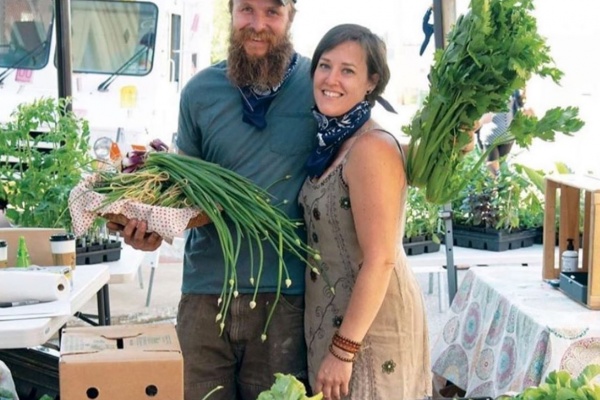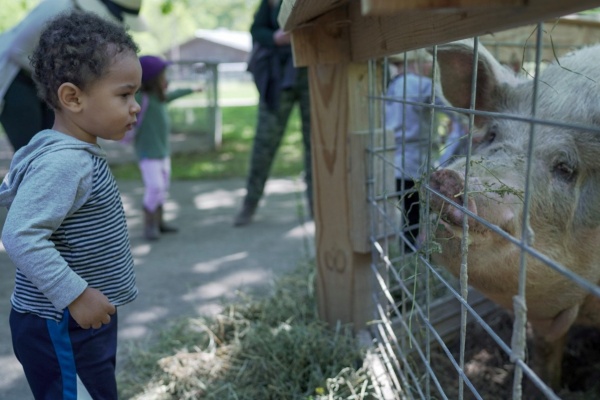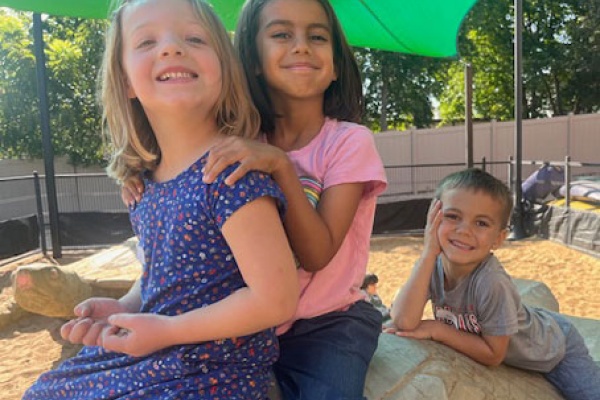
The Lies We Tell
My daughters love the zoo. When we lived in St. Louis City and I worked part-time, it was nothing to hop on Hampton and head to the zoo for an hour or two.
City and I worked part-time, it was nothing to hop on Hampton and head to the zoo for an hour or two.
Now that we live on the East Side, going to the zoo is a 40-minute exodus that requires days of planning and organizing. Snacks must be packed, diaper bags assembled, minivan filled with $4 gas.
However, that hasn’t stopped my little animal lovers from requesting a zoo trip on a weekly basis. So, to appease them, we take frequent trips to the “Edwardsville Zoo,” aka PetSmart, on pet adoption days (or PETCO – yes, we have two zoos in town. We’re quite metropolitan).
I know - by twisting the truth and letting my daughters think we have our own neighborhood zoo, I’m a lying sack of crap. But if they’re content and the day is temper-tantrum-free, is lying a bad thing?
Our little white lies
Almost every parent has told a fib to his or her child. In a 2008 study, 66% of parents admit to turning to a white lie if all else fails, and eight out of 10 parents say they’ve lied to protect their kids from the truth.
So why do we do it?
“We all tell little white lies,” said Pam Dyson, child development expert, parenting coach and licensed professional counselor. “They’re part of normal communication. If your child painted you a picture, you would tell him it was beautiful even if it wasn’t. If the breakfast they made for you included burnt toast and soggy cereal, you would say it was delicious. We often resort to little white lies when we’re short on time, need our children to do something or avoid something, or we don’t have a better way of explaining things to our child.”
The reasons some parents have resorted to lies?
- When the “why” line of questioning doesn’t stop, sometimes you just crack. For instance, when her son wouldn’t stop begging for Peeps, Pam told him if he ate Peeps after dark, he’d get a bellyache. The 3-year-old shunned Peeps the rest of Easter.
- A lie can protect your kids. After her kids wouldn’t stop running from her in Target, Sarah explained to them she didn’t want them to get lost. When that didn’t work, she pointed out the security guard who would “arrest them and throw them in jail where they’d never watch Yo Gabba Gabba! again.” Her kids immediately jumped in the cart.
- Let’s face it – sometimes it’s just darn funny. For years, my Dad and I had my little brother believing Mick Jagger and Steven Tyler were the same person. I once told MJ rain is really angels peeing from the sky just to see her run in the house in disgust. Since our kids eliminated our movie date nights, sometimes we have to turn to them for entertainment.
Heck, almost all of us lied this past weekend when we said a six-pound bunny managed to fill plastic eggs with Reese’s Pieces and hide them around the backyard.
Dang, kids are gullible.
The truth comes out
While slipping in a white lie can get our kids into bed or stop them from ingesting gummy worms all day, more often than not, honesty is the best policy.
According to Dyson, there are certain topics, such as death, divorce and adoption, that you shouldn’t lie about to a child. As parents, we can censor many of the details to protect our children, but not being upfront about the big picture can have a harmful effect on a child’s ability to trust.
Dyson explained, “Kids know when you’re not being truthful. They can tell by your eyes, your body language. What are you teaching your child about telling the truth? If a child is old enough to ask a question, they’re old enough to hear an honest answer. If your child catches you in an outright lie you need to say, ‘I had a good reason for not telling you, but I should have told the truth.’ If you don’t have the answer, it’s ok to say you don’t know rather than telling your child a lie.”
For instance, my friend who was a major pot-head for most of his adult life was asked by his teenage daughter whether or not he had ever smoked the ganja. He responded with a firm “no.”
“If I say no, it’s a lie,” he admitted. “If I say yes, then say I didn’t enjoy it, that’s a lie too. I don’t want her to think that since Dad smoked, it’s alright for her to experiment.”
Dyson recommended that Dad should look at what’s to be gained by lying – is he trying to protect his daughter? Or is the lie really for his benefit? Instead, Dyson noted, “He could be honest and tell her that he’s not proud of the choice he made when he was young, and that he’s open to talking about this with her so she can make better choices.”
She also suggested that if parents deem a subject matter too uncomfortable to discuss, a variety of books and online resources, covering everything from sexuality to drugs, is available to provide them with a springboard for addressing challenging topics with their children.
When it comes right down to it, I’m sure I’m banished to parent hell for telling MJ Fruit Roll-Ups are created when elephants stomp on strawberries. But when she’s 13 and wants to know about safe sex, believe me, I’ll be the first one putting a condom on the banana.
So, what little white lies do you tell your little ones to get through the day?
By Nicole Plegge, Lifestyle Blogger for SmartParenting

Metro East mom Nicole Plegge has written for STL Parent for more than 12 years. Besides working as a freelance writer & public relations specialist, and raising two daughters and a husband, Nicole's greatest achievements are finding her misplaced car keys each day and managing to leave the house in a stain-free shirt. Her biggest regret is never being accepted to the Eastland School for Girls. Follow Nicole on Twitter @STLWriterinIL





















